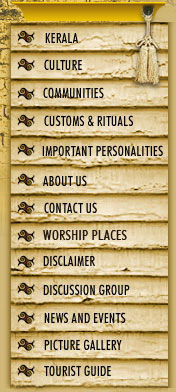
|
|
MUSLIM CUSTOMS AND RITUALS
|
Barath
According to Muslim belief, barath is the day in which Allah (God) distributes food grains to the people. Muslims celebrate the day as an important one as Hindus celebrate Vishu.;
Chelakarmam
Chelakarmam is the circumcision ceremony among Muslims. It is also known as Sunnath, Markkakalyanam etc.
Ehramkettu
Muslim pilgrims to Mecca used to wear white clothes that do not have stitches. Wearing of this cloth is known as Ehramkettu
Hajj
The hajj is one of the two pilgrimages to Mecca required by all Muslims. All healthy adult Muslim men and women should perform it at least once in their lifetime if they have sufficient means. The Hajj is to be performed during the first half of the month Dhu al Hajja. Those who performed Hajj use honorific title Hajiyar.
Ka-aba Pradikshinam
Ka-aba Pradikshinam is a ritual performed by Muslims in connection with Hajj pilgrimage to the Holy Mecca.
Kabaradakkam
Kabaradakkam is the rituals connected with the burial of dead body in the mosque. Soon after death, the dead body is laid in such a way that the legs are turned towards Mecca. The dead body after washing covered with a white cloth. Mulla from the mosque then chants verses of Quran. Then the body is taken to the mosque in a plank specially provided for the purpose. After prayers, the body is laid in the burial pit and the relatives pour mud over the body by chanting verses of Quran. On completion of the burial, a stone each is placed on the head side and leg side.
Kalima
The Kalima is the chanting of "La ilah illa Allah wa Muhammad rasul Allah", which means that there is only God and Muhammad is His prophet. It is also uttered as part of the Muslim call to prayer.
Khathuba
Khathuba is the sermon delivered by the Khatheeb (the leader who leads prayers) before the ommencement of Friday sermon in the mosque.
Nikkah
The marriage of Muslims is known as Nikkah. There are very few differences on the rituals of Nikkah between the Muslims of North Kerala and South Kerala. The first ritual is the fixation of date and time of marriage. On the day before the marriage, there is another rite known as Kalthi. The marriage is formally registered at this function. The marriage takes place in bride's residence. Tying of thali, exchanges of rings are also performed. Oppana is a special item. The bride's parents send sweets and fruits to the bridegrooms house and vice versa.
Niskaram
Niskaram is the five obligatory daily prayers, which is also known as namaz. The prayers are performed before sunrise, at noon, in the mid-afternoon, immediately after sunset, and at night between 8 and 9 O'Clock. Niskaram is also associated with a specified set of positions, such as standing, bowing, and prostrating. On Fridays, Niskaram is to be performed in the mosque.
Noyambu
Noyambu is the fast prescribed for healthy, adult Muslims during the 30 days of Ramadan month. From dawn until dusk, no food, drink, or sexual relations are permitted. Patients and feeding mothers are exempted from fasting, but they are expected to make up for missing the fast at other times.
Oathu (chanting)
Study of Qur'an in the mosque is known as Oath. Arabic language is also taught as a part of Oath.
Thalaq
Thalaq is the procedure of divorce prevailing among Muslims. Before a divorce came into effect, the husband would make statement for three times in the presence of witnesses. Before saying Thalaq certain conditions are to be fulfilled. After three statements of divorce is made, the couple cannot remarry each other unless the wife marries another man and is widowed or divorced again.
Umrah
Umrah is also a pilgrimage like Hajj. Muslims perform this with the rituals of Ehramkettal (wearing of un-swen cloth), Thavaf (rounding of Ka-aba), walking between Safa and Marva for seven times. Unlike Hajj, Umrah can be performed at any month.
Zakat
The zakat or alms tax is levied annually and distributed to the poor to be essentially performed by a Muslim
|
|
|
| |
|
|
|
|



